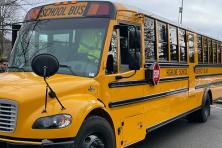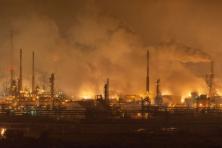We need cleaner options to move both ourselves and goods around in our communities. Transportation is currently the top source of climate pollution in Washington, and fumes from fossil fuel-powered vehicles harm our health. The good news is that the Department of Ecology is working on updating our clean vehicles rules. According to the American Lung Association, this update will save Washingtonians $5.9 billion in avoided health costs between now and 2050.
These rule updates will do several critical things:
- Ensure that automakers provide an increasing amount of clean, zero emissions passenger vehicles for Washingtonians. All new passenger vehicles must be zero emissions beginning model year 2035. Additionally, automakers are pushed to provide clean vehicles at a reduced price for community mobility programs (the Advanced Clean Cars II rule).
- Reduce harmful, smog-forming pollution from new heavy trucks through stronger vehicle standards (the Heavy-Duty Omnibus Low NOx rule).
- Collect information on vehicle fleets in Washington to better shape future pollution-reducing policy (the Fleet Reporting Requirement).
Together, these rules will help transform our transportation system—reducing greenhouse gas emissions and toxic air pollution, and providing Washingtonians with access to more clean vehicles. Without these key changes, we will struggle to meet our climate goals and will remain beholden to the health-harming oil industry.
Of course, the oil industry is fighting back hard so they can maintain their profit margins: in Washington, they make 83 cents per gallon of gas in pure profit. We need to show that Washington State is excited about clean cars, and that we support these new rules.
Send a message
Send a message to the Department of Ecology: we support strong clean vehicle standards in Washington! Adopting these rules are critical to meeting our climate goals, protecting our health, and making clean transportation accessible to Washingtonians. You can use this message as a template, but it would be great if you added why these rules matter to you personally!
Sample message to the Department of Ecology:
Dear Adam Saul,
Thank you for the opportunity to comment on the proposed Clean Vehicles Program rule. I strongly support the adoption of Advanced Clean Cars II, the Heavy-Duty Omnibus Low NOx Rule, and the Fleet Reporting Requirement.
Washington needs to adopt Advanced Clean Cars II to meet its climate goals according to the State Energy Strategy, which says that basically all new passenger vehicle sales must be zero emissions in 2035 and beyond to affordably decarbonize our economy. We already see the impacts of the climate crisis today with record-breaking heatwaves and more frequent smoke events.
We need to switch to clean vehicles to stop polluting our air. I don’t want vehicles that spew fumes driving through my neighborhood and polluting my lungs, and I want everyone who drives to have access to clean vehicles. This is why Advanced Clean Cars II and its equity provisions are important. So is the Heavy-Duty Omnibus Low NOx Rule, which improves emission standards for large vehicles.
It is also important to gather more information on our transportation system so we can better address the harms it is causing–not only to the environment, but sometimes to workers through poor labor practices. This is why the Fleet Reporting Requirement is an important piece of this regulation.
Every new vehicle sold that is powered by fossil fuels is a missed opportunity. Relying on polluting vehicles hurts the climate and our health. It also makes us beholden to oil companies that bring in record profits while raising prices. We need clean options in Washington.
I strongly support this rule and thank the Department of Ecology for its hard work.
Sincerely,
[Name]





